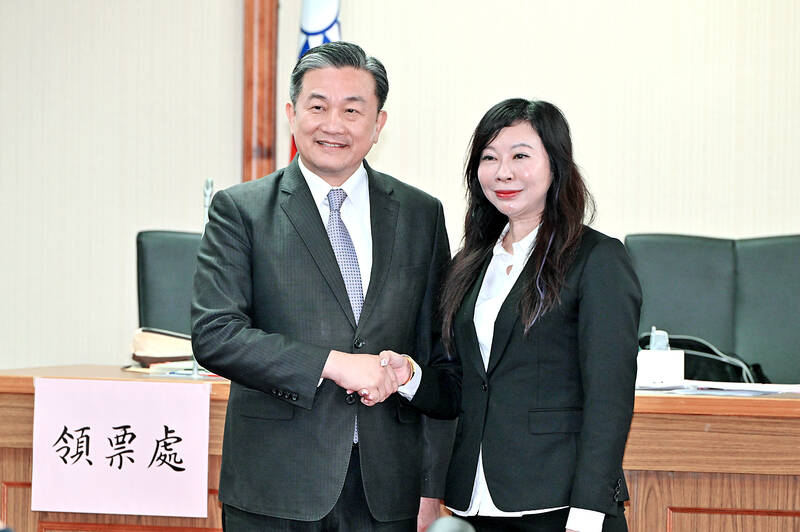Taiwan People’s Party (TPP) Legislator Lin Yi-chun (林憶君) was yesterday voted cochair of the legislature’s Foreign Affairs and National Defense Committee, becoming the only member of her party to lead a committee this session thanks to backing from the Chinese Nationalist Party (KMT).
The legislature’s eight committees yesterday met to vote on the new cochairs, with each committee led by one legislator from the ruling party and another from the opposition.
Lin and Democratic Progressive Party (DPP) Legislator Wang Ting-yu (王定宇) were appointed leaders of the Foreign Affairs and National Defense Committee.

Photo: Tien Yu-hua, Taipei Times
Lin’s appointment to the important committee was unexpected, given that the TPP only holds eight seats, all as legislators-at-large, in the 113-seat body, compared with the 52 seats of the main opposition party, the KMT.
Despite winning a third consecutive presidential term, the DPP has ruled as a minority government since May after it lost its majority in the legislature in January’s elections.
Together commanding a majority in the legislature, KMT and TPP lawmakers have cooperated in the past few months to pursue shared goals, such as expanding the legislature’s power in supervising the executive branch.
In the previous session, the KMT ceded the opposition chair of the Internal Administration Committee to independent Legislator May Chin (高金素梅).
No TPP member chaired a committee during the previous session.
Lin said she was thankful to the KMT for allowing her to assume the position, and that she hoped to live up to expectations as the TPP and KMT cooperate to oversee legislative affairs.
Asked if the budget would be cut for the Indigenous Defense Submarine (IDS) program, Lin said that legislators would continue to discuss and investigate the matter.
Last month, Premier Cho Jung-tai (卓榮泰) approved plans to build seven submarines from next year to 2038 at an estimated cost of NT$284 billion (US$8.92 billion), extending the program that began constructing its first submarine under former president Tsai Ing-wen (蔡英文) and has continued under President William Lai (賴清德).
Admiral Huang Shu-kuang (黃曙光), the former head of the IDS program, is the older brother of TPP Legislator Vivian Huang (黃珊珊).
Asked whether that relationship and his resignation earlier this year would affect budget talks, Lin said not to jump to conclusions, adding that legislators would closely supervise the budget.
Lin did not clarify whether her appointment to the committee was decided in talks with the KMT and TPP on Tuesday or yesterday, but said that she respects the parties’ coalition.
Regarding whether any conditions had been placed on her cochair role, she declined to comment.
In addition to the Foreign Affairs and National Defense Committee, the legislature has seven other standing committees that review proposed legislation.
Following yesterday’s election of all standing committee leaders, the DPP cochairs eight committees, the KMT cochairs seven and the TPP cochairs one.

Taiwanese can file complaints with the Tourism Administration to report travel agencies if their activities caused termination of a person’s citizenship, Mainland Affairs Council Minister Chiu Chui-cheng (邱垂正) said yesterday, after a podcaster highlighted a case in which a person’s citizenship was canceled for receiving a single-use Chinese passport to enter Russia. The council is aware of incidents in which people who signed up through Chinese travel agencies for tours of Russia were told they could obtain Russian visas and fast-track border clearance, Chiu told reporters on the sidelines of an event in Taipei. However, the travel agencies actually applied

New measures aimed at making Taiwan more attractive to foreign professionals came into effect this month, the National Development Council said yesterday. Among the changes, international students at Taiwanese universities would be able to work in Taiwan without a work permit in the two years after they graduate, explainer materials provided by the council said. In addition, foreign nationals who graduated from one of the world’s top 200 universities within the past five years can also apply for a two-year open work permit. Previously, those graduates would have needed to apply for a work permit using point-based criteria or have a Taiwanese company

The Shilin District Prosecutors’ Office yesterday indicted two Taiwanese and issued a wanted notice for Pete Liu (劉作虎), founder of Shenzhen-based smartphone manufacturer OnePlus Technology Co (萬普拉斯科技), for allegedly contravening the Act Governing Relations Between the People of the Taiwan Area and the Mainland Area (臺灣地區與大陸地區人民關係條例) by poaching 70 engineers in Taiwan. Liu allegedly traveled to Taiwan at the end of 2014 and met with a Taiwanese man surnamed Lin (林) to discuss establishing a mobile software research and development (R&D) team in Taiwan, prosecutors said. Without approval from the government, Lin, following Liu’s instructions, recruited more than 70 software

Chinese spouse and influencer Guan Guan’s (關關) residency permit has been revoked for repeatedly posting pro-China videos that threaten national security, the National Immigration Agency confirmed today. Guan Guan has said many controversial statements in her videos posted to Douyin (抖音), including “the red flag will soon be painted all over Taiwan” and “Taiwan is an inseparable part of China,” and expressing hope for expedited reunification. The agency last year received multiple reports alleging that Guan Guan had advocated for armed reunification. After verifying the reports, the agency last month issued a notice requiring her to appear and explain her actions. Guan